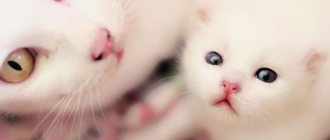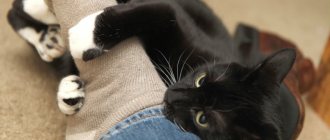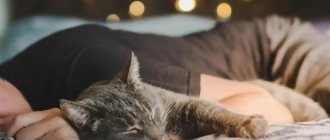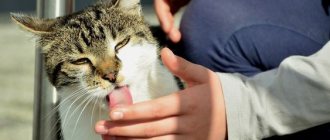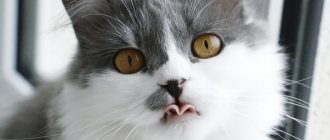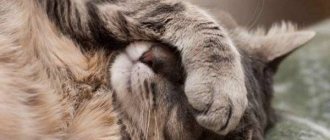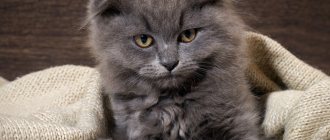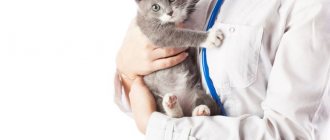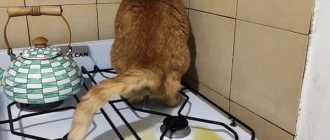Cats are considered the best mothers. Purrs often accept other people's children and not just kittens. Experienced breeders know that the miracle of birth can be overshadowed by the incomprehensible behavior of the young mother. Some cats eat their kittens, and there is no fully adequate explanation for this phenomenon yet.
Does your cat have breeding value and pedigree? Are you planning to breed a certain breed? If the answers are yes, the first thing you need to do is study all the possible nuances of four-legged behavior. The fact is that absolutely everything, even the most cruel and illogical (from your point of view) actions can be justified. Naturally, you won’t be able to predict all the problems and nuances, but everyone can avoid making gross mistakes.
Veterinarians and felinologists explain the fact that mother cats eat kittens in different ways. All theories agree on one thing: we are talking about either cannibalism or accident. Even experienced breeders may encounter this problem when it comes to the first birth of a cat.
Note! Cannibalism is a phenomenon that is the act of eating an animal of its own relative (of the same species and genus). This phenomenon is not (!) rare; it occurs in more than 1000 species of animals and in humans.
Prevention measures
Experienced breeders, when detecting such inappropriate behavior in a cat, remove it from further breeding, since cannibalism is inherited. The many reasons why a cat strangles her kittens make them difficult to identify. In this regard, the following preventive measures should be followed:
Balanced and nutritious nutrition for a pregnant female with the inclusion of vitamin and mineral supplements in food. A veterinarian will help you get recommendations on creating the optimal diet for pregnancy and after birth. Monitoring the level of calcium in the blood to prevent postpartum eclampsia should be done through clinical analysis, since both high and low levels of the mineral in the body are dangerous;
Preparing the nest in a secluded, quiet and safe place, inaccessible to outside animals. A thick cardboard box or exhibition box is suitable for these purposes. The nest should be placed in a dark place. It should be dry and warm. This organization corresponds as closely as possible to the natural conditions inherent in the cat at the genetic level.
Preventive measures
Cannibalism is not considered a physical disease. Therefore, treatment with medications will not give results. If the owner notices that a pregnant cat has an unstable mental state, manifested by excessive activity, fussiness or irritability, he is recommended to increase monitoring of the animal.
It is important to pay more attention to her and show her love more often. A few weeks before the start of lambing, she is provided with a secluded place where she and her brood will feel calm
This could be a special cat house, a box or a wooden box with soft bedding, an entrance hole and a window for observing the birth in order to provide timely assistance if needed.
When kittens are born, it is important to provide the pet with maximum peace and not to be excessively intrusive. But you can’t completely ignore it either.
Other pets should be removed from the room during the birth. The owner must be on alert in order to save the kitten's life in time.
Pathological causes
Mental disorders
Psycho-emotional disorders experienced during childbirth can cause a cat to eat kittens. Such inappropriate behavior can be provoked by unsatisfactory conditions for childbirth: an unprepared “nest”, its inadequacy for raising young, the presence of strangers and animals.
Hormonal abnormalities
Due to hormonal imbalances, the cat’s maternal instinct may not be formed, and then the cat perceives the cubs as strangers and can eat them.
The issue is especially acute when the cat does not give birth naturally, but has to undergo a caesarean section. Since instincts may not be triggered, the cat perceives the cubs as strangers.
Therefore, if you notice aggression from the mother towards the offspring, immediately separate the cubs from her. Of course, you will have to look for another mother, and the babies will have little chance of survival, but cannibalism can be prevented.
Can a cat eat kittens? Why do cats eat kittens?
As you already understand, the situation when a cat eats kittens is rare. Can adult male cats kill a kitten because it is alien, sick, or for some other reason? And if so, why do cats eat kittens?
Practice shows that cats rarely kill kittens and mostly through negligence (crushed, strangled, etc.). Therefore, you don’t need to worry too much about this if you have a mother with a litter and an adult cat in your house. There is no need to worry especially if the two of them live in the house and there are no other males.
However, some males, like females, inherit cannibalism. Can a cat kill a kitten because it is a cannibal? Definitely yes. Can a cat bite a kitten for this reason? Yes. If a cat ate kittens, does that mean he is a cannibal? Most likely, yes too.
Article continues after advertisement
But the claim that adult cats can kill a kitten simply because they do not like them, consider them future competitors, or are trying to kill kittens from competing cats is largely a myth. However, tragic situations do happen.
It’s a completely different story if someone else’s cat kills a kitten. There may indeed be intent here. But it does not consist in a sense of competition, as happens, for example, with lions. Most likely, if a cat killed kittens from another father, in fact, this has nothing to do with their father, but with their mother. Thus, the cat, having looked for a female for mating, provokes her to start a new heat as soon as possible, when she can be covered. He knows that while she has small children, she most likely will not flow or show interest in him. But if the cat killed the kitten, he has a chance.
What should owners do?
What to do if a cat carries kittens? This is the question that puzzles owners as they watch their pet looking for a new place for her offspring and transferring the cubs there.
First of all, it is necessary to understand the reasons that prompt the animal to such actions. Kittens should not be selected or placed in a place chosen by the owner. It is necessary to trace where the cat has found a new place and help build her a nest.
The animal should be denied access to places where the arrangement of a new place would be unsafe (balcony, space under the bathroom, etc.). Under no circumstances should you scold or punish a caring mother.
The animal obeys natural instincts and takes care of its offspring as nature dictates.
Owners sometimes misinterpret why a cat brings kittens to bed. You should not think that a caring mother entrusts her offspring to household members or brags about her kittens. Such feelings are alien to animals. The reason for the behavior is the search for a more favorable place for their offspring. And the master’s bed can be chosen as this place (warm, dry, clean).
There is also nothing touching about an animal dragging its cubs to a person. The reason why a cat brings kittens to the owner is, as a rule, a lack of food. The pet perceives humans as a source of food resources. As babies grow older, milk is no longer enough and they need solid food. This is why a cat brings its cubs to humans as a source of food.
Pathological causes
The natural behavior of an animal is based on its instincts. Even millennia of domestication did little to change them. But in some cases, the cause of cannibalism lies in the illness of the mother.
Pregnancy can cause hormonal and mental disorders
To understand why the cat ate the kitten, you need to study its condition.
Hormonal problems
Due to various failures, the formation of the maternal instinct may be disrupted in the female. This happens especially often due to caesarean section. In this case, the production of oxytocin is delayed, and the cat perceives live kittens as strangers.
For your information! Sometimes everything is limited to aggression or ignoring the kids.
Maternal instinct may wake up after a while, but it’s better not to risk it. Childbirth takes a lot of energy from a cat, and she can eat her offspring. Therefore, in case of aggression on her part, the babies must be removed and fed independently.
Psychical deviations
Another reason why animals exhibit cannibalism is mental disorder. Such problems arise not only among people. They can be provoked by difficult childbirth, lack of a “nest,” the presence of people and other factors.
Sometimes mental problems develop due to congenital pathologies. If the animal is aggressive, often bites and scratches, and hisses, then it is not advisable to breed an evil cat. It is more likely that her behavior will affect her offspring.
Sometimes a cat may not eat the kittens right away. Nervous females may do this after humans carry and handle the cubs. In this case, she will perceive the kids as strangers.
Mental disorders may become visible after childbirth. In this case, the cat immediately shows aggression towards the offspring and leaves them.
Cat behavior
Males can also destroy cubs, and this happens not only with other people's babies. It is not obvious to all owners why cats eat kittens. The main goal of males is to fertilize as many females as possible. Therefore, they can stimulate the onset of estrus by killing the kittens.
In this case, the cat takes the cub, strangles it, but does not eat it. He won't be able to swallow it or tear it apart. Therefore, cats subconsciously strive to find a secluded and inaccessible place.
Important! During pregnancy, it is better to remove the cat for a while. Preferably before all kittens are weaned
Cats can also have mental problems. Then they perceive all the kids as strangers and try to kill them. Pet owners need to carefully monitor their pets' behavior.
Prevention measures
Experienced breeders, when detecting such inappropriate behavior in a cat, remove it from further breeding, since cannibalism is inherited. The many reasons why a cat strangles her kittens make them difficult to identify. In this regard, the following preventive measures should be followed:
Balanced and nutritious nutrition for a pregnant female with the inclusion of vitamin and mineral supplements in food. A veterinarian will help you get recommendations on creating the optimal diet for pregnancy and after birth. Monitoring the level of calcium in the blood to prevent postpartum eclampsia should be done through clinical analysis, since both high and low levels of the mineral in the body are dangerous;
Preparing the nest in a secluded, quiet and safe place, inaccessible to outside animals. A thick cardboard box or exhibition box is suitable for these purposes. The nest should be placed in a dark place. It should be dry and warm. This organization corresponds as closely as possible to the natural conditions inherent in the cat at the genetic level.
Observation of the birth process of the pet. Unobtrusive help from the owner will calm the mother cat and allow her to control the cat. If aggressive and inappropriate behavior of the mother is detected, newborns should be isolated. The animal, on the recommendation of a veterinarian, may be prescribed sedatives to calm the nervous system.
Availability of food and water after birth. Food resources should not only be freely available to the cat, but also in close proximity to the nest. This will reduce the mother’s nervousness about leaving her babies in the nest, allowing the animal to quickly get enough and eliminate protein deficiency.
Cannibalism in domestic cats is a serious mental disorder based on ancient natural instincts. An animal with a predisposition to eating its own offspring should be excluded from breeding and breeding. Cannibalism has no cure. However, taking preventive measures will allow you to avoid such complex psychological deviations.
Feeding formulas
Kittens can be given formulas intended for children. These are the well-known products Malyutka and Malysh, Nestozhen, Nutrilon. Prepare them according to instructions
There are 2 simple recipes for preparing a nutritional mixture, but it is important to follow all dosages:
- cow's milk, homemade – 50 g;
- powdered milk – 15 g;
- dry nutritional yeast – 3 g;
- egg - 50 g of white with yolk and 50 g of foam from a beaten egg;
- 1 g sunflower oil;
- 4 g pharmaceutical glucose.
The ingredients are mixed (only in a ceramic container) until they have a homogeneous consistency. The finished mixture is drawn into a syringe.
Another kitten formula recipe:
- 25 g homemade milk;
- 5 g milk powder;
- 2 g glucose;
- 1 g vitamin supplements.
The ingredients are mixed. Vitamin supplements in tablet form must be ground into powder in advance and added to the rest of the ingredients.
Ready-made artificial substitutes. The best food for a newborn is ready-made cat milk substitutes. Recommended brands:
- Pet Lac;
- Nutri Vet;
- Babycat Milk;
- Beapher Kitty-Milk.
The only drawback of artificial milk substitutes is the likelihood that the baby will have allergic reactions to the chosen product.
Veterinarians recommend feeding kittens with infant formula and milk replacers. When preparing it yourself, there is a high probability of making mistakes in the dosage of one of the products, and this can result in the development of complications in the digestive tract.
Reasons for the destruction of offspring
Cat cannibalism is a common phenomenon, which is the process of an animal eating its own relative.
There are several factors for a cat destroying its own offspring. The main reasons are the following:
- Lack of milk. The cat eats the weakest kittens to feed the stronger ones.
- Human curiosity. Under no circumstances is it recommended to hold newborn babies. This reckless action could cost the kitten its life. The cat, sensing someone else's smell, refuses it or eats it.
- Postpartum shock. The cat is genetically programmed to free the born kitten from the placenta and destroy stillborn cubs. But a cat that has lambed for the first time, being in postpartum shock, often cannot distinguish a dead baby from a living one and eats the entire litter.
- Jealousy. Cats are jealous creatures. Some individuals, not wanting to share their master's love, get rid of their offspring, and they may not do this immediately, but after one or even three to four weeks after the birth of the kittens. Therefore, in the first month of life, it is not recommended to pick them up, and you should also pay more attention to the pet.
- Genetic failure. Animal psychologists believe that a cat that has given birth is prone to mental disorders. Therefore, if the breeder notices a change in the condition of a pregnant pet, the litter is taken away immediately after lambing.
- Physical deviation. The mother cat “relieves defective and too weak kittens from suffering” by eating them.
- Mastitis. The disease is accompanied by severe pain. The young mother regards the kittens' attempts to eat as an attack and therefore deals with the entire litter at once.
Prevention measures
Experienced breeders, when detecting such inappropriate behavior in a cat, remove it from further breeding, since cannibalism is inherited. The many reasons why a cat strangles her kittens make them difficult to identify. In this regard, the following preventive measures should be followed:
Balanced and nutritious nutrition for a pregnant female with the inclusion of vitamin and mineral supplements in food. A veterinarian will help you get recommendations on creating the optimal diet for pregnancy and after birth. Monitoring the level of calcium in the blood to prevent postpartum eclampsia should be done through clinical analysis, since both high and low levels of the mineral in the body are dangerous;
Preparing the nest in a secluded, quiet and safe place, inaccessible to outside animals. A thick cardboard box or exhibition box is suitable for these purposes. The nest should be placed in a dark place. It should be dry and warm. This organization corresponds as closely as possible to the natural conditions inherent in the cat at the genetic level.
Pathological causes
Mental disorders
Psycho-emotional disorders experienced during childbirth can cause a cat to eat kittens. Such inappropriate behavior can be provoked by unsatisfactory conditions for childbirth: an unprepared “nest”, its inadequacy for raising young, the presence of strangers and animals.
Hormonal abnormalities
Due to hormonal imbalances, the cat’s maternal instinct may not be formed, and then the cat perceives the cubs as strangers and can eat them.
The issue is especially acute when the cat does not give birth naturally, but has to undergo a caesarean section. Since instincts may not be triggered, the cat perceives the cubs as strangers.
Therefore, if you notice aggression from the mother towards the offspring, immediately separate the cubs from her. Of course, you will have to look for another mother, and the babies will have little chance of survival, but cannibalism can be prevented.
Causes
Many people know about such an evolutionary factor as natural selection from the school biology curriculum. Most often, this is the reason that cats kill their kittens. There are also a number of other factors that push an animal to kill.
Maternal instinct
Many people are familiar with the situation when, after the birth of kittens, their mother becomes aggressive and protects the offspring in every possible way. Animals have a very strongly developed maternal instinct. In nature, for example, a cat hides its offspring from prying eyes for a long time and takes care of them until the cubs become independent. It turns out that maternal instinct is not only a benefit for babies, but sometimes also a cause of death.
During pregnancy, no one screens animals for genetic abnormalities, so only after the kittens appear can one judge the health of the offspring. Animals are their own diagnosticians. The mother immediately sees which of her cubs was born sick, so she tries to get rid of him as quickly as possible. In nature, a cat simply leaves the baby, but at home it eats its newborn kittens. Why can’t you just give them up and not feed them? The answer to this question will again be the fact of a highly developed sense of responsibility for the offspring. For a mother, abandoning a baby is a lot of stress, so the animal struggles with this situation radically.
Sometimes owners say that a week passed after the birth, everything was fine, the mother took care of the kittens, and one day some of the babies were missing or found dead. One of the reasons for inappropriate behavior is a lack of milk. In this case, the cat itself decides which of the kittens to keep and which to kill, because she cannot waste milk, so valuable for healthy babies, on their weak and sick brother. Scientists still cannot understand how a cat determines the level of vitality of its babies.
When a person is nearby
No matter how much the owner cares about his pet and her children, a human will always be the odd one out in a cat family. Some animals are very jealous of people touching their newborn babies. Someone else's smell can completely kill the maternal instinct. The animal may perceive a kitten that has been in the hands of a person as a stranger and try to get rid of it. This also explains why cats eat their kittens born by Caesarean section. Instincts play a big role here: no natural childbirth means no launch of a program to activate maternal feelings. For the same reason, cats often refuse to feed other people's offspring, although dogs do this without problems.
Firstborn cats
Studies have shown that it is mother cats who give birth for the first time who are the most aggressive towards their offspring. It's all about changing hormonal levels, as a result of which the feeling of selfishness takes precedence over the maternal instinct. And this happens most often with pets. The love of the owner is the goal of life for an animal, so you don’t want to share it with someone else, even if that someone is your own child. To prevent the situation, the owner must monitor his pet during childbirth: if after the birth of the first kitten the cat licked it, then everything will be fine with the rest, but if it growls and rushes, then it is better to take the baby away from such a would-be mother.
Rock of fate
After giving birth, animals always eat the afterbirth and dead babies. Sometimes, due to a state of shock, the animal has a malfunction, and the new mother confuses the dead kitten with a living one or gets carried away with eating the placenta and eats the baby along with it. To prevent this from happening, the owner must be nearby. There are cases when a cat injures its children while gnawing the umbilical cord.
A cat (cat) eats kittens - what to do?
Now you know the answer to the question, do cats eat kittens - their own and others'. If such a situation occurred by chance or because the kitten had a pathology, then this is absolutely normal and nothing needs to be done. But if this is not the first time a cat has done this and there are no apparent reasons, then it is sterilized and is no longer used to produce offspring. This indicates a genetic tendency towards cannibalism, which is inherited.
It is also better to castrate kittens from such a cat and not use them when producing offspring, because with a high degree of probability they can also carry the gene for cannibalism.
Rate and share!
